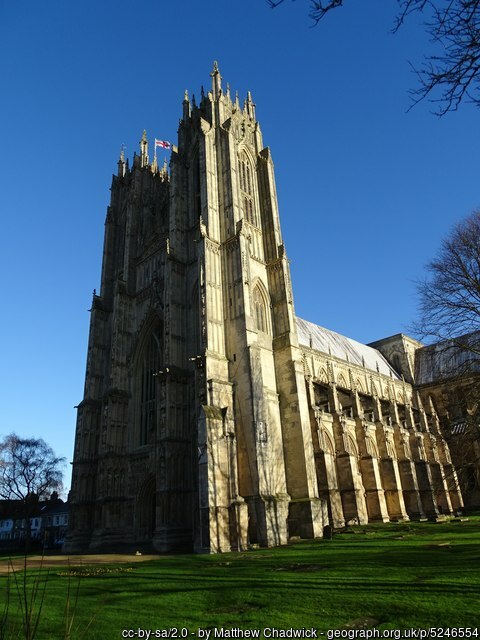The other day, whilst looking through the scanned plea rolls on the AALT website, I thought I might have made a bit of a discovery – a long poem in English, in the midst of a Latin entry. Probably unsurprisingly, it had long since been discovered and written up, more than a hundred years ago, in fact. Nevertheless, I think it deserves another outing.
The case concerned some Yorkshire men who had come to the attention of the authorities for their disruptive behaviour. It was written up from the indictment, and commented upon, by a man with more titles than one might consider strictly necessary – ‘the Reverend Professor Skeat Litt. D’,[1] in the Yorkshire Archaeological Journal vol. 15 for 1900.[2] The indictment is here, and the corresponding plea roll entry here.[3] The indictment is from 1392 and the plea roll entry from 1393, both in the latter part of the reign of Richard II.
As indictment and plea roll entry note, jurors of Yorkshire wappentakes made a number of accusations, including various sorts of disorderly conduct. Those accused included John Berdwald of Cottingham, and at least 31 others, said to have formed some sort of organisation to support each other in litigation and quarrels, six years previously, contrary to laws against maintenance, and some of them had been unruly and violent. The specific poem-related accusation was that John Berwald junior composed a rhyme in English, and had it spoken in public at Beverley on Sunday 21st July 1392, and at Hull the following Sunday, and at various other places in Yorkshire that year. The rhyme was set out in the indictment and the plea roll, going like this,[4] …
‘In the countrè heard was we that in our soken shrewes shuld be, with-al for to bake.
Among this Frer[e]s it is so, and other ordres many mo, whether they slepe or wake.
And yet wil ilkan hel[d] up other, and meynten him als his brother, bothe in wrong and right.
And so will we in stond and stoure, meynten oure negheboure, with al oure myght.
Ilk man may come and goo among us both to and froo, I say you sikyrly.
But hethyng wil we suffre non, neither of Hobbè ne of Johan, with what man that he be.
For unkynde we ware yif we suffird of lesse or mare any vilans hethyng.
But it were quit double agayn, and [he] a-corde and be ful fayn to byde oure dressyng.
And on that purpos yet we stand; who-so do us any wrang in what plas [that] it fall,
Yet he might als[o] wel, als[o] I hap and hele, do a-geyn us all.’
The overall sense is that these men want to behave like friars and stand together against all comers, taking each other’s part in quarrels.
It seems interesting to me in a number of respects. First, it is clearly not a vote of confidence in the system of justice generally available: such alliances would not be needed if normal legal processes were considered appropriate. Secondly, assuming that there is some truth in it, the declaration of mutual support is an interesting counter-current to the anti-maintenance views of more literary authors, noted in Jonathan Rose’s book on maintenance.[5] Here, the confederacy is announced, celebrated, justified in terms of its similarity to the behaviour of friars and in terms of a positive idea of natural solidarity.
Secondly, there is the matter of the authorities’ strategy. It seems to me that they may have run into what might be termed the ‘Mike Read/Frankie Goes To Hollywood problem’, after a notable incident in the 1980s when a BBC Radio 1 presenter drew everyone’s attention to the rather rude words of the song ‘Relax’ – promptly helping the song to rise to chart domination. Was it really necessary to give the whole rhyme in indictment and plea roll? Could some phrase like ‘seditious rhyme’ not have been sufficient? The inclusion of the rhyme does make me wonder what would have been the reaction to it amongst those involved in making these records – did they repeat it to each other, or tap a foot along with its rhythm? I have to say, as a complete non-expert (I actually find medieval literature a bit scary, always feeling that I am missing allusions, references, the point …) that I think it’s quite catchy.[i]
26/06/2021
[1] (‘So you’re a cleric and a leading academic …’ as I believe H.R.H. Shania Twain had it, in an early iteration of country-pop classic ‘That Don’t Impress Me Much’, before going for the Brad Pitt verse …).
[2] (a journal which manages expectations of readers by including in its preface the following slightly gloomy line: ‘It is hoped that the contents of the volume are not inferior in interest to those of its predecessors.’)
[3] The front of this membrane is here.
[4] (after Skeat, checked against the plea roll text – there are only very small differences).
[5] Rose, J. (2017). Maintenance in Medieval England (Cambridge Studies in English Legal History). Cambridge: Cambridge University Press. doi:10.1017/9781107358324, c.7,
Image – Beverley Minster, which must be somewhere near the site of the alleged naughty poetry reading. And, OK, some of that is post-Ric. II, but it’s very pretty, isn’t it? Never been. Hope I can visit it one day.
[i] and rather better than this effort at political protest which an anonymous bard of our own days was unable to suppress, on the subject of more recent political events …
Unhealthy ministrations
He’s come to a sticky end, Matt
the pound-shop BJ, pant, slip, splat;
his back-hand- jobs sleaze –
the old Tory disease –
just how could anyone fancy that?
